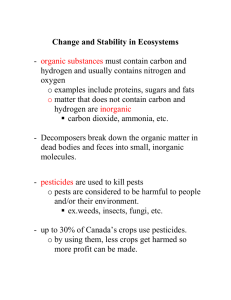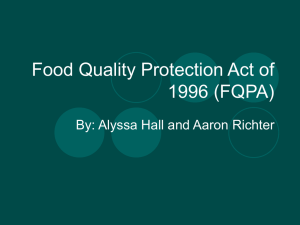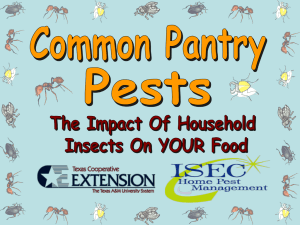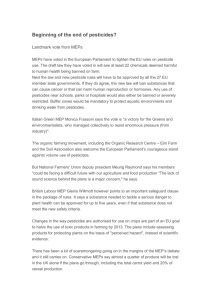Chapter 14: Food, Soil and Agriculture
advertisement
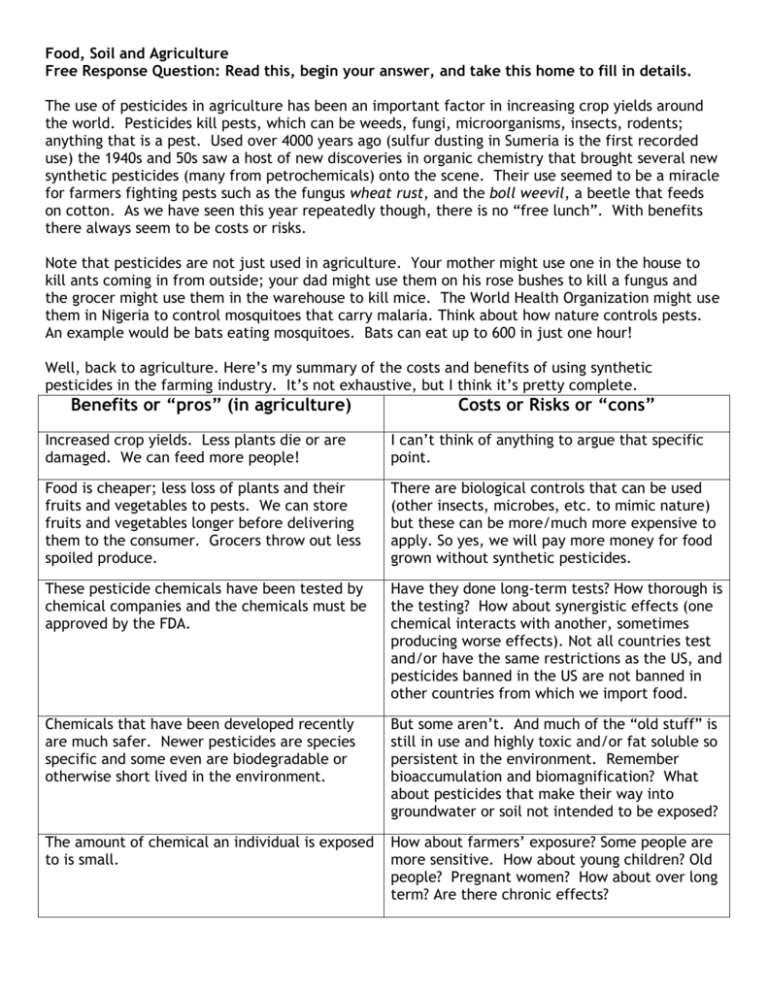
Food, Soil and Agriculture Free Response Question: Read this, begin your answer, and take this home to fill in details. The use of pesticides in agriculture has been an important factor in increasing crop yields around the world. Pesticides kill pests, which can be weeds, fungi, microorganisms, insects, rodents; anything that is a pest. Used over 4000 years ago (sulfur dusting in Sumeria is the first recorded use) the 1940s and 50s saw a host of new discoveries in organic chemistry that brought several new synthetic pesticides (many from petrochemicals) onto the scene. Their use seemed to be a miracle for farmers fighting pests such as the fungus wheat rust, and the boll weevil, a beetle that feeds on cotton. As we have seen this year repeatedly though, there is no “free lunch”. With benefits there always seem to be costs or risks. Note that pesticides are not just used in agriculture. Your mother might use one in the house to kill ants coming in from outside; your dad might use them on his rose bushes to kill a fungus and the grocer might use them in the warehouse to kill mice. The World Health Organization might use them in Nigeria to control mosquitoes that carry malaria. Think about how nature controls pests. An example would be bats eating mosquitoes. Bats can eat up to 600 in just one hour! Well, back to agriculture. Here’s my summary of the costs and benefits of using synthetic pesticides in the farming industry. It’s not exhaustive, but I think it’s pretty complete. Benefits or “pros” (in agriculture) Costs or Risks or “cons” Increased crop yields. Less plants die or are damaged. We can feed more people! I can’t think of anything to argue that specific point. Food is cheaper; less loss of plants and their fruits and vegetables to pests. We can store fruits and vegetables longer before delivering them to the consumer. Grocers throw out less spoiled produce. There are biological controls that can be used (other insects, microbes, etc. to mimic nature) but these can be more/much more expensive to apply. So yes, we will pay more money for food grown without synthetic pesticides. These pesticide chemicals have been tested by chemical companies and the chemicals must be approved by the FDA. Have they done long-term tests? How thorough is the testing? How about synergistic effects (one chemical interacts with another, sometimes producing worse effects). Not all countries test and/or have the same restrictions as the US, and pesticides banned in the US are not banned in other countries from which we import food. Chemicals that have been developed recently are much safer. Newer pesticides are species specific and some even are biodegradable or otherwise short lived in the environment. But some aren’t. And much of the “old stuff” is still in use and highly toxic and/or fat soluble so persistent in the environment. Remember bioaccumulation and biomagnification? What about pesticides that make their way into groundwater or soil not intended to be exposed? The amount of chemical an individual is exposed to is small. How about farmers’ exposure? Some people are more sensitive. How about young children? Old people? Pregnant women? How about over long term? Are there chronic effects? Human Health effects such as leukemia, cancers, poisoning, endocrine disruption, depression have been linked to individual pesticides. And what about other animals that are exposed to the pesticides when they are spread, even though they are not the target organism? Think about decline in bird populations ala DDT. Who is studying effects on them? And what about the web of life of which are all a part? When we tug on one strand of the web we affect other strands. Insects (and other pests) evolve resistance to the chemical pesticides just like antibiotic resistance…so we will need to continuously create new killers. So…here are the questions. 14 points total. Do not attempt to answer the questions on this page. 1) Looking at the pros and cons why won’t everyone agree on what to do? How to proceed? Note that this is one of those questions that appears in every environmental science topic! You could write a research paper on this topic! A meaty paragraph would be fine, here.(4 pts) 2) Pick two of the points listed in the table above and find specific evidence in support of the point. For example, one would be: farmers’ exposure to chemical pesticides…find specific evidence that a pesticide has or has not caused health effects to farmers. Cite your source. One case or study & source is enough; this isn’t a research paper. (3 pts for each of the two points) 3) Identify one specific pest and describe its harm in agriculture or on human health. Explain how it is chemically controlled and then give an alternate, nonchemical control. (4 pts.)
